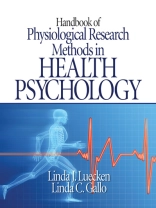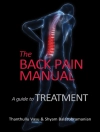The field of health psychology has exploded in the last decade due to progress identifying physiological mechanisms by which psychological, social, and behavioral factors can put people′s health and well-being at risk.
The
Handbook of Physiological Research Methods in Health Psychology provides thorough, state-of-the-art, and user-friendly coverage of basic techniques for measurement of physiological variables in health psychology research. It is designed to serve as a primary reference source for researchers and students interested in expanding their research to consider a biopsychosocial approach. Chapters addressing key physiological measures have been written by international experts with an eye towards documenting essential information that must be considered in order to accurately and reliably measure biological samples. The book is not intended to be a lab manual of specific biomedical techniques, nor is it intended to provide extensive physiological or anatomical information. Rather, it takes the approach most useful for a non-specialist who seeks guidance on how and when to collect biological measures but who will have the actual samples assayed elsewhere.
The
Handbook can be thought of as a primer or a gateway book for researchers new to the area of physiological measurement and for readers who would like to better understand the meaning of physiological measures they encounter in research reports.
Содержание
PART I. INTRODUCTION TO THE MEASUREMENT OF PHYSIOLOGICAL PROCESSES
1. Physiological Research Methods in Health Psychology: Applications of the Biopsychosocial Model — Linda C. Gallo and Linda J. Luecken
2. Measuring Physiological Processes in Biopsychosocial Research: Basic Principles Amid Growing Complexity — Timothy W. Smith and Bert N. Uchino
PART II. PHYSIOLOGICAL SYSTEMS AND ASSESSMENTS
A. HORMONAL
3. Measurement of Cortisol — Nancy A. Nicolson
4. Sympathetic Hormones in Health Psychology Research — Paul J. Mills and Michael G. Ziegler
5. Assessment of Salivary Alpha-Amylase in Biobehavioral Research — Douglas A. Granger, Katie T. Kivlighan, Mona El-Sheikh, Elana B. Gordis, and Laura R. Stroud
B. CARDIOVASCULAR
6. The Measurement of Blood Pressure in Cardiovascular Research — William Gerin, Tanya M. Goyal, Elizabeth Mostofsky, and Daichi Shimbo
7. Cardiovascular Stress Reactivity — Tanya M. Goyal, Daichi Shimbo, Elizabeth Mostofsky, and William Gerin
8. Ambulatory Blood Pressure Monitoring — Denise Janicki-Deverts and Thomas W. Kamarck
9. Non-invasive Assessment of Autonomic Influences on the Heart: Impedance Cardiography and Heart Rate Variability — Julian F. Thayer, Anita L. Hansen, and Bjorn Helge Johnsen
C. IMMUNE
10. Laboratory-Based Measures of Immune Parameters and Function — Shamini Jain, Suzi Hong, Laura Redwine, and Paul J. Mills
11. Immunological Functioning II: Field Measures and Viral Challenge — Aric A. Prather and Anna L. Marsland
PART III. BROAD MARKERS OF HEALTH AND DISEASE RISK
12. Measuring Adiposity in Health Research — Mary C. Davis
13. The Measurement of Physical Activity, Physical Fitness, and Physical Function — Jennifer L. Etnier
14. Metabolic Syndrome — Katri Räikkönen, Eero Kajantie, Anna Rautanen, and Johan G. Eriksson
15. Lipid, Lipoprotein, and Inflammatory Markers of Atherosclerosis — Catherine M. Stoney
16. Measurement of Sleep by Polysomnography — Martica Hall, Michele L. Okun, Charles W. Atwood, Daniel J. Buysse, and Patrick J. Strollo, Jr.
PART IV. EMERGING TOPICS
17. Neuroimaging: Overview of Methods and Applications — Lee Ryan and Gene E. Alexander
18. Electroencephalography and Event-Related Potentials — Daren C. Jackson and Cory A. B. Jackson
19. Genetic Factors in Psychophysiological Research — Jeanne Mc Cafferey
Об авторе
Dr. Linda C. Gallo received her Ph D in Clinical Psychology (Health Concentration) from the University of Utah in 1998. After completing an NIH postdoctoral fellowship in Cardiovascular Behavioral Medicine at the University of Pittsburgh, she joined the faculty of San Diego State University and the SDSU/UCSD Joint Doctoral Program in Clinical Psychology, where she is currently an Associate Professor and a Senior Core Investigator at the Center for Behavioral and Community Health Studies. Dr. Gallo’s research examines socioeconomic and ethnic disparities in cardiovascular and other chronic diseases, with a special focus on the roles that stress, emotional factors, and social relationships have in these disparities. Dr. Gallo has published more than 30 articles and chapters, appearing in such outlets as the Annals of Behavioral Medicine, Health Psychology, Psychosomatic Medicine, Psychophysiology, and Psychological Bulletin. Her current research is funded by the National Heart Lung and Blood Institute and the National Institute of Diabetes and Digestive and Kidney Diseases.












